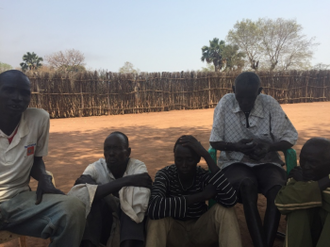CAFOD and Trocaire on frontline as famine is declared in South Sudan

Sitting listelessly - Santino Matwili (right) is losing his sight because of malnutrition
On Monday, UN agencies officially declared famine in parts of South Sudan. War and a collapsing economy have left 100,000 people facing starvation now. A further one million people have been classified as being on the brink of famine, according to the World Food Programme (WFP) and other UN bodies.
Commenting on the news, CAFOD's Country Representative, Francis Flood, based in the capital Juba said: "The people of South Sudan are dealing with hunger and starvation and what is now a protracted conflict. Vulnerable families are struggling to take care of themselves, and many are out of reach of vital humanitarian assistance because of the conflict. Violence and displacement have pushed people to the brink, surviving on what they can - women pick leaves to feed to their children to stave off hunger pangs. And as so often in humanitarian emergencies such as this one, it is the most vulnerable who are worst affected - women, children and the elderly.
"The UN figures are alarming - 5 million people are in urgent need of food; 3.6 million have fled their homes. Daunting though these numbers are, CAFOD and Trocaire have a long history of working in the country, and our local Church partners refuse to be overwhelmed, as they continue to be on the frontline doing everything they can to support the most vulnerable families in makeshift camps, church compounds, and in communities cut off by the conflict.
"We need an end to the fighting so that more people can receive the critical humanitarian assistance they need - food, water and sanitation, healthcare, protection and shelter. Despite shattered lives, the many people I meet are still determined to hold onto hope. We must keep that hope alive with humanitarian aid they so urgently need. "
CAFOD and Trócaire started working in together in South Sudan, as CAFOD and Trócaire in Partnership on 1 April 2015. Both agencies have a long history of working in South Sudan through church and non-church partners who support vulnerable people in communities, providing food, water and sanitation and supporting communities to earn a living through better farming methods.
Read more about the situation in South Sudan here: http://cafod.org.uk/News/Emergencies-news/South-Sudan-crisis-Q-and-A


















